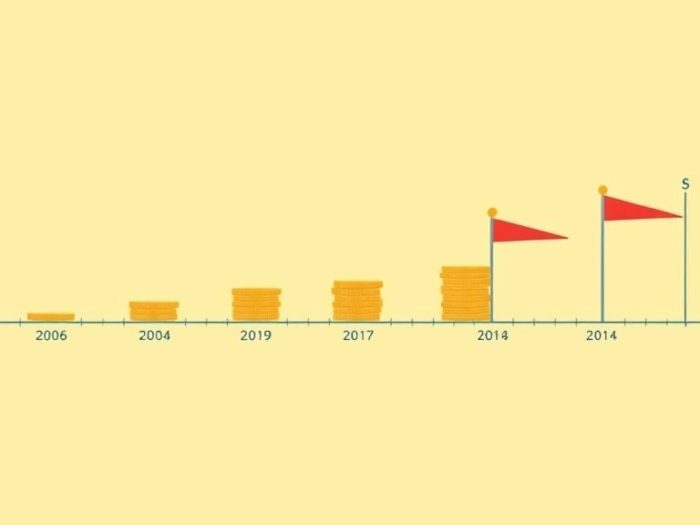One of the most common questions about retirement planning is: “Am I on track?” Knowing
how much you should have saved for retirement at different ages can help you assess your
progress and make necessary adjustments. This article provides a general guideline to help
you determine if your retirement savings are on the right track.
Understanding the Rule of Thumb
A common rule of thumb suggests having a certain multiple of your annual salary saved by
different ages. This guideline assumes you start saving early and consistently.
General Savings Guidelines by Age
These are general estimates and may vary based on your individual circumstances.
- Age 30: Have saved at least 1x your annual salary.
- Age 40: Have saved at least 3x your annual salary.
- Age 50: Have saved at least 6x your annual salary.
- Age 60: Have saved at least 8x your annual salary.
-
Age 67 (Full Retirement Age): Have saved at least 10x your annual
salary.
Example
If your annual salary is $60,000, here’s how much you should aim to have saved:
- Age 30: $60,000
- Age 40: $180,000
- Age 50: $360,000
- Age 60: $480,000
- Age 67: $600,000
Factors to Consider
These guidelines are a starting point, but several factors influence how much you should
have saved:
1. Lifestyle and Expenses
Your expected lifestyle and expenses in retirement are crucial. A more lavish lifestyle
requires more savings.
2. Retirement Age
If you plan to retire early, you’ll need to save more to cover a longer retirement period.
3. Social Security Benefits
Factor in your estimated Social Security benefits, though they shouldn’t be your sole
source of income.
4. Pension Income
If you have a pension, you may need to save less.
5. Healthcare Costs
Healthcare expenses tend to increase significantly in retirement.
6. Investment Returns
These guidelines assume a certain rate of return on your investments. Higher returns
allow you to save less, while lower returns require more savings.
Important Notes
-
Start Early: The earlier you start saving, the more time your investments
have to grow through compound interest. -
Be Consistent: Consistent saving is crucial, even if you can only save
small amounts at first. -
Adjust as Needed: Regularly review and adjust your savings goals as
your income and circumstances change. -
Don’t Panic: If you’re behind on your savings, don’t panic. Take steps
to increase your savings rate and explore catch-up contribution options.
Conclusion
These age-based savings guidelines provide a helpful framework for assessing your
retirement readiness. However, remember that they are just estimates. It’s crucial to
consider your individual circumstances and consult with a financial advisor to create a
personalized retirement plan.
Related Keywords
Retirement savings by age, how much to save for retirement, retirement savings goals,
retirement planning, retirement calculator, retirement income, retirement nest egg,
retirement funds, retirement age, plan for retirement.
Frequently Asked Questions (FAQ)
1. What is the general rule of thumb for retirement savings by age?
A common rule of thumb suggests having 1x your annual salary saved by 30, 3x by 40,
6x by 50, 8x by 60, and 10x by your full retirement age (FRA).
2. Are these savings guidelines exact?
No, these are general estimates and may vary based on your individual
circumstances.
3. What are the key factors that influence how much I should save?
Key factors include your expected lifestyle and expenses in retirement, your
planned retirement age, Social Security benefits, pension income (if any), and
potential healthcare costs.
4. Why is it important to start saving for retirement early?
Starting early allows your investments more time to grow through compound
interest, which can significantly increase your savings over time.
5. Is it okay if I’m behind on my savings?
Don’t panic if you’re behind. Take steps to increase your savings rate and
explore catch-up contribution options.
6. What are catch-up contributions?
Catch-up contributions are additional contributions allowed by the IRS for
individuals aged 50 and older to retirement accounts like 401(k)s and IRAs.
7. Should I only rely on Social Security for retirement income?
No, Social Security benefits should be considered a supplement to your retirement
savings, not your sole source of income.
8. How do healthcare costs factor into retirement savings?
Healthcare expenses tend to increase significantly in retirement, so it’s crucial
to factor them into your savings calculations.
9. What should I do if my retirement plans change?
Regularly review and adjust your savings goals as your income and circumstances
change.
10. Should I consult a financial advisor about my retirement savings?
Yes, consulting a financial advisor is highly recommended for personalized
guidance on retirement planning.



